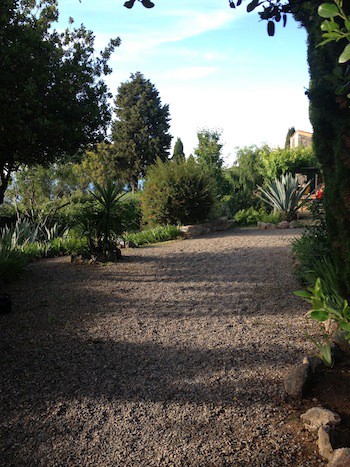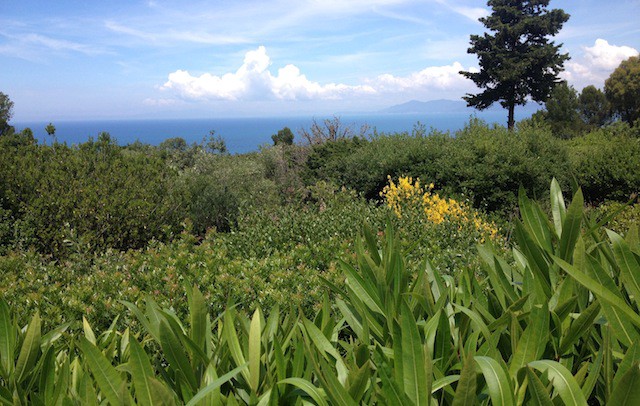Summer Invites and the Word “Yes”
by Christina Fitzpatrick

Invitations are something I’ve always, almost automatically refused. Not invitations from close friends, of course. I’m talking about those sorts of opportunities that involve hanging out with Unknowns at an Unknown location with Unknown escape routes. This tendency to decline is not out of snobbery. It’s a result of intense introversion and the type of fright that is deeply imaginative and forecasts disaster accurately 36 percent of the time.
If you are unlike me, know that you have a gift that will propel you toward greatness — and a more fruitful sex life, to boot.
That being said, even adventurers refuse some overtures. Perhaps it’s too short notice: an incoherent man in a neighboring cab shouts an alternate address. Or too complicated: a friend wants you to go on a drug-and-diarrhea-laced voyage with a shaman she met at Gray’s Papaya.
I myself am not interested in most spiritual cures, but there is one I’m starting to believe in: the summer invite.
Years ago, I flew into Rome after a shitty 11-hour indirect flight. My vision was blurred, a headache was building behind my nose, my balance felt off kilter, especially on the shoulder-to-shoulder tarmac bus. My luggage was lost. I waited in a line — an Italian line, which is a very long and slow moving one — to describe my luggage’s shape. The driver who awaited me hated me. We got lost in traffic and I might’ve told him the wrong address.
When I arrived at my friend Simona’s place, she said, “We are going to a party!” It was 3 p.m. in the apartment, 3 a.m. in my skull. I said, “How about you go and I don’t?”
“The party is all weekend,” she said, “at this house by the sea.” Italians use the phrase “by the sea” far more than you and me. It’s charming, usually.
“I don’t want to go,” I said, and got in her bed.
“You have to go,” she said. “There is no choice.”
She says this when she’s annoyed with me: There is no choice.
I took a shower. A man arrived who looked like Richard Gere if he were always amused. He drove like a continuously amused Richard Gere: terribly. At some point in the car, Simona told me we didn’t actually have a place to sleep that night.
“You make a friend,” she suggested.
The whole ride I slept in the backseat sitting up, awaking randomly to rain, then fog, then blinding streams of gold and heat. We arrived in a place called Porto Santo Stefano. Docks. Sailboats. Narrow streets festooned with tiny triangular flags, the kind that belong on a child’s bicycle. We ate slices of pizza and gazed at photos of cats on the pizzeria walls. The elderly owner told us the cats’ names and how they had died.

The house appeared before us a bit later, after a series of hilly, twisty roads, each dangerously slight, the width of a single Fiat. We parked in gravel, walked in gravel. I heard voices. A bunch of men were sitting around a long patio table, gabbing, dressed in khakis and collared shirts, the sort of dress that makes me feel inherently unwell, like I’m in a certain Pretty in Pink scene, at Blaine’s friend’s house.
At some point I sat down with the khaki set. I ate something. I think it was pasta. I drank something. I think it was wine. Benevolent people with babies came — benevolent people who sometimes lingered under a tree, away from their babies, smoking joints. Others arrived, and so did music, the very peppy Euro kind. There was a dance area and a garden that smelled of rosemary and honeysuckle and lavender. I told the host that I thought Berlusconi looked like Tony the Tiger. Many agreed. I made cocktails for Simona at a makeshift bar overlooking the endless sea. I danced with someone, who would later be a boyfriend for a week or two. I danced with four others, who would be friends for a lifetime. I stayed up until six in the morning, willingly, and later slept in a twin bed that someone gave up for me.
I only write about this because I recently visited the same house, sat at the same patio table I once dreaded, and thought, in my pajamas and flip flops over breakfast: what if you’d never come?
Perhaps all of us need someone to tell us: There is no choice.
(See also.)
Christina Fitzpatrick is the author of the novel ‘What’s the Girl Worth?’ and the short story collection ‘Where We Lived.’ She’s currently at work on a novel and tweets @chrisFitzptrick.